Castor oil may support digestive health, skin hydration, and overall wellness when used safely and correctly. This versatile oil, derived from the seeds of Ricinus communis, has been valued for centuries in traditional medicine and modern pharmacology. Today, research-backed evidence highlights its usefulness mainly as an over-the-counter (OTC) laxative and as a topical moisturizer or emollient. Understanding how castor oil works—and where it fits into a healthy routine—can help you use it responsibly and effectively.
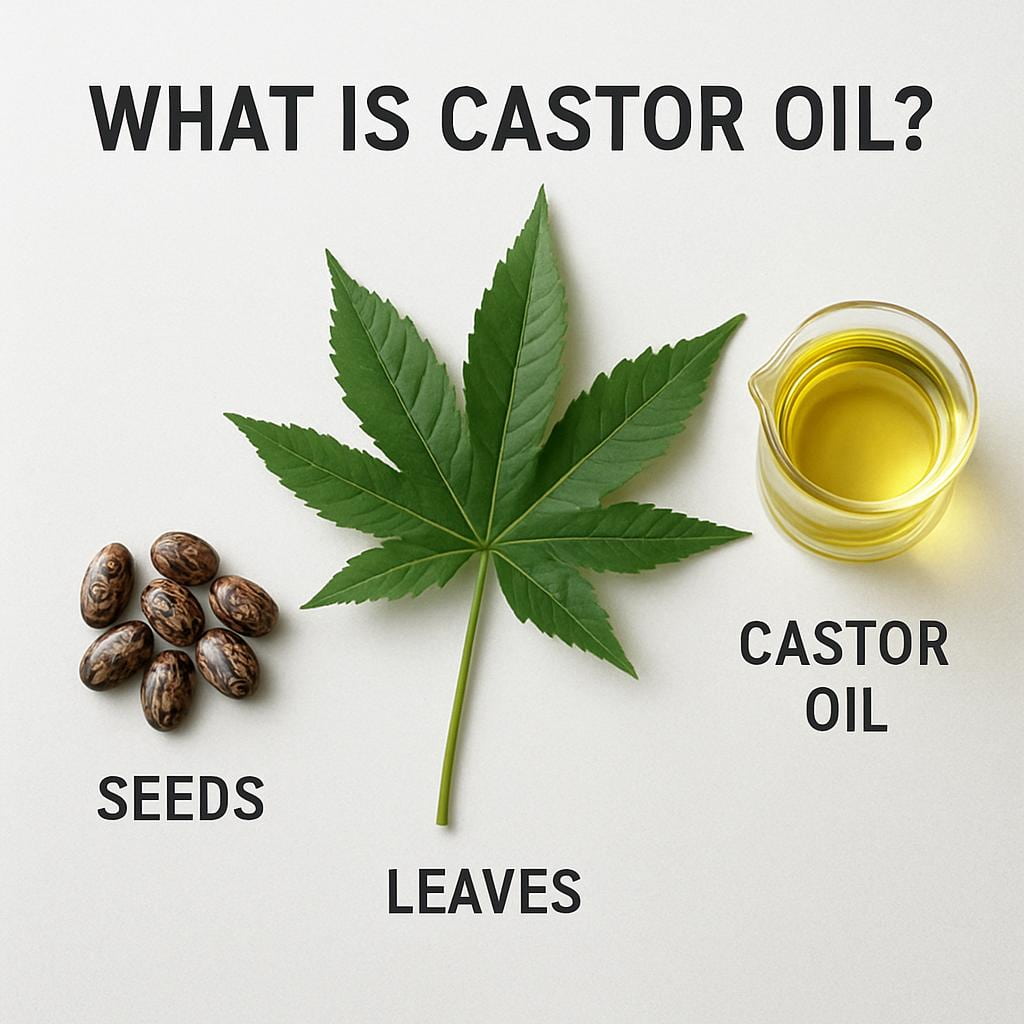
What Is Castor Oil? (Overview and Nutrition Profile)
Castor oil is a natural vegetable oil derived from the seeds of the Ricinus communis plant, known for its thick texture and high ricinoleic acid content.
It has been used for centuries in wellness, cosmetic, and pharmaceutical applications—from digestive relief to skin care—because of its unique fatty-acid composition and chemical stability.
When properly processed, castor oil does not contain ricin, the toxin found in raw castor beans. The oil is extracted by cold-pressing and then heat-treating the seeds, which safely removes any toxic proteins. The U.S. Food and Drug Administration (FDA) classifies castor oil as Generally Recognized as Safe (GRAS) for specific food and drug uses, including its approved role as an over-the-counter stimulant laxative (FDA OTC Monograph M007).
Chemical and Nutritional Composition
Although not a nutrient-dense food, castor oil contains key fatty acids that influence its wellness benefits:
| Component | Approx. % | Functional Role | Source |
|---|---|---|---|
| Ricinoleic acid (C18:1 OH) | 85–90 % | Supports intestinal motility and acts as an emollient on skin | NIH PubChem |
| Oleic acid | 3–6 % | Provides moisturizing and antioxidant support | USDA FoodData Central |
| Linoleic acid (Omega-6) | 2–4 % | Contributes to skin barrier maintenance | Harvard T.H. Chan School of Public Health |
| Stearic & Palmitic acids | < 2 % | Add thickness and protective film-forming properties | Cosmetic Science Review 2024 |
These triglycerides give castor oil its viscous texture, stability, and moisturizing power.
Because it’s largely composed of ricinoleic acid—a compound rarely found in other natural oils—castor oil behaves differently from coconut, olive, or argan oil, making it valuable in both therapeutic and cosmetic formulations.
10 Proven Health Benefits of Castor Oil (Backed by Science)
Scientific research shows that castor oil may support digestive, skin, and overall wellness when used appropriately. While some traditional claims remain unverified, many of its practical uses—especially for digestion and skin care—are backed by clinical and pharmacological data. Below are ten research-supported ways castor oil can benefit your body safely and effectively.
1. Supports Digestive Regularity

Castor oil is best known for its stimulant laxative properties, supporting short-term relief from occasional constipation.
According to the U.S. Food and Drug Administration (FDA) and DailyMed (2025), it is approved for over-the-counter use. Its primary compound, ricinoleic acid, interacts with intestinal prostaglandin receptors, increasing motility and promoting fluid secretion that softens stool.
Typical adult dosage: 15–60 mL once daily.
Tip: Use short-term only, drink plenty of water, and avoid frequent use to prevent electrolyte imbalance.
2. Helps Maintain Skin Hydration

Castor oil functions as an occlusive moisturizer, forming a barrier that helps the skin retain water. This may support smoother, softer skin, particularly in dry or rough areas.
The Journal of Dermatological Treatment (2024) reports that oils high in triglycerides like castor oil may strengthen the skin’s lipid barrier and enhance moisture retention. It’s also commonly found in lip balms, hand creams, and natural body oils.
Tip: Apply a few drops to damp skin after cleansing to lock in hydration.
See also: Harvard Health – Moisturizers and Skin Barrier Care.
3. Supports Wound and Skin Barrier Health
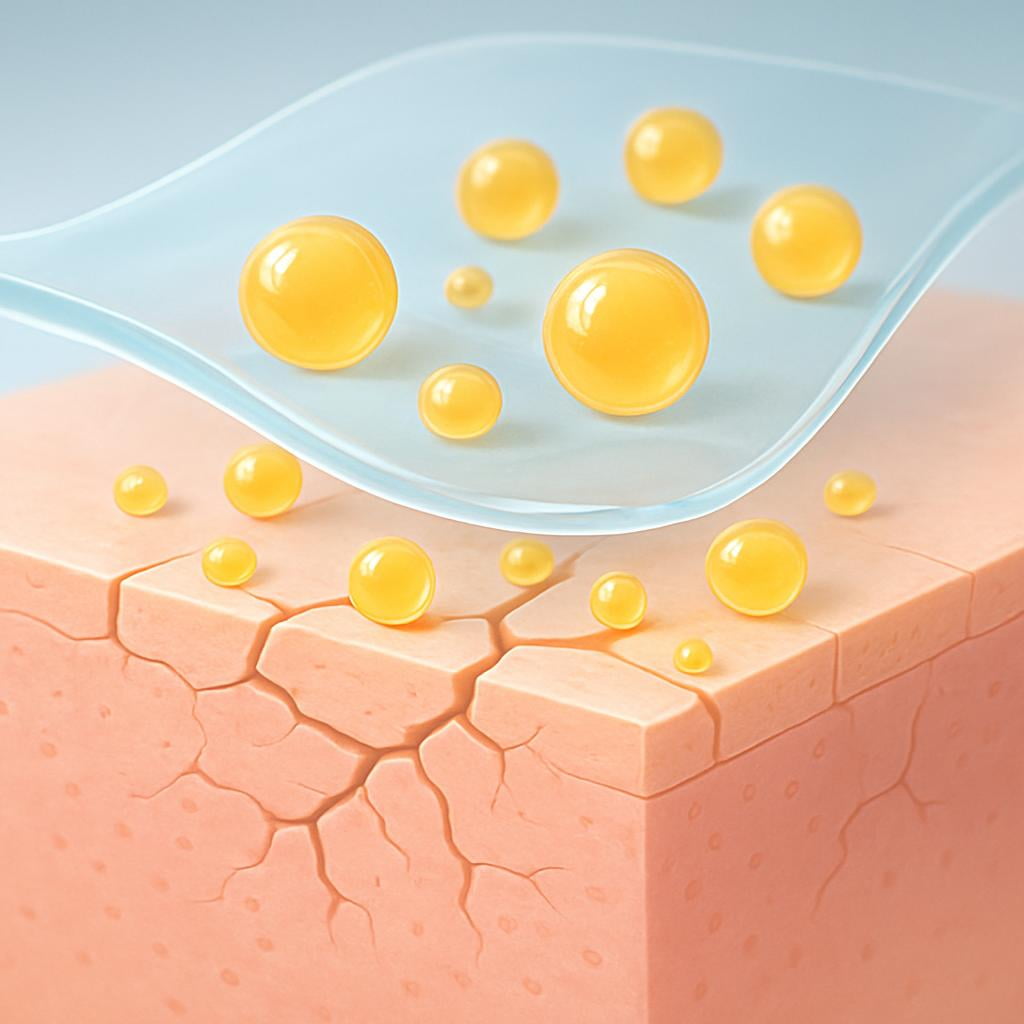
Castor-oil-based ointments, such as Venelex® (which combines balsam peru and castor oil), help maintain a moist wound environment, which supports the body’s natural recovery process.
According to the U.S. National Library of Medicine Drug Database (DailyMed, 2024), these formulations are used for minor burns, ulcers, and pressure sores as a protective emollient.
Caution: Do not apply raw castor oil directly to open wounds without medical guidance.
4. May Support Dry Eye Relief
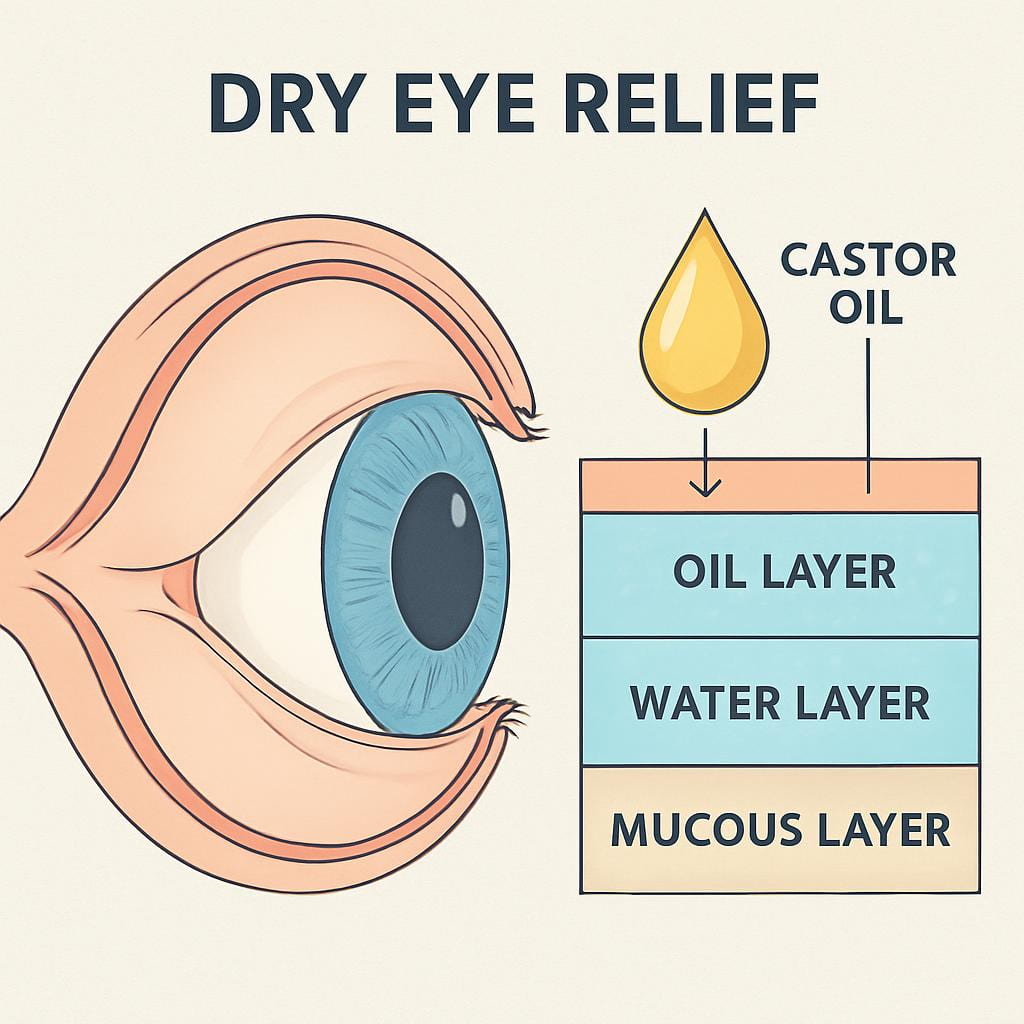
Recent ophthalmology research suggests that castor oil eye drops may help reduce tear evaporation and support ocular surface comfort.
A Clinical Ophthalmology (2023) study found that 0.25% castor-oil-based drops improved meibomian gland function and enhanced tear stability in mild blepharitis.
Use only sterile, pharmaceutical-grade products designed for the eyes—never raw castor oil.
Reference: National Center for Biotechnology Information – Clinical Ophthalmology Journal
5. Supports Scalp and Hair Health
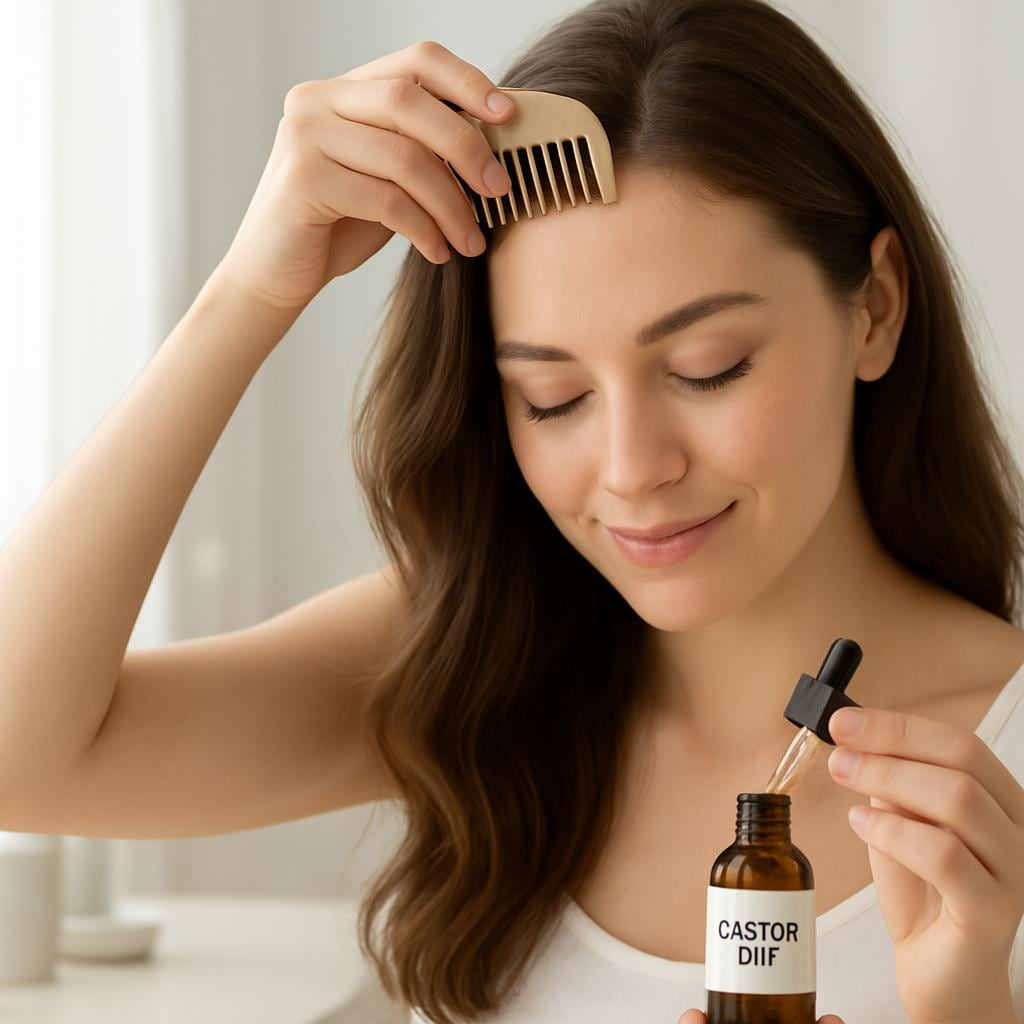
Castor oil’s high concentration of ricinoleic acid may help nourish and moisturize the scalp, supporting comfort and reducing dryness.
Although clinical evidence for hair growth is limited, dermatology experts, including those from the Cleveland Clinic, acknowledge its conditioning and softening benefits for hair strands and scalp health.
Tip: Blend with lighter oils such as jojoba or argan for better spreadability and less stickiness.
6. May Aid Skin Barrier Function in Sensitive Skin
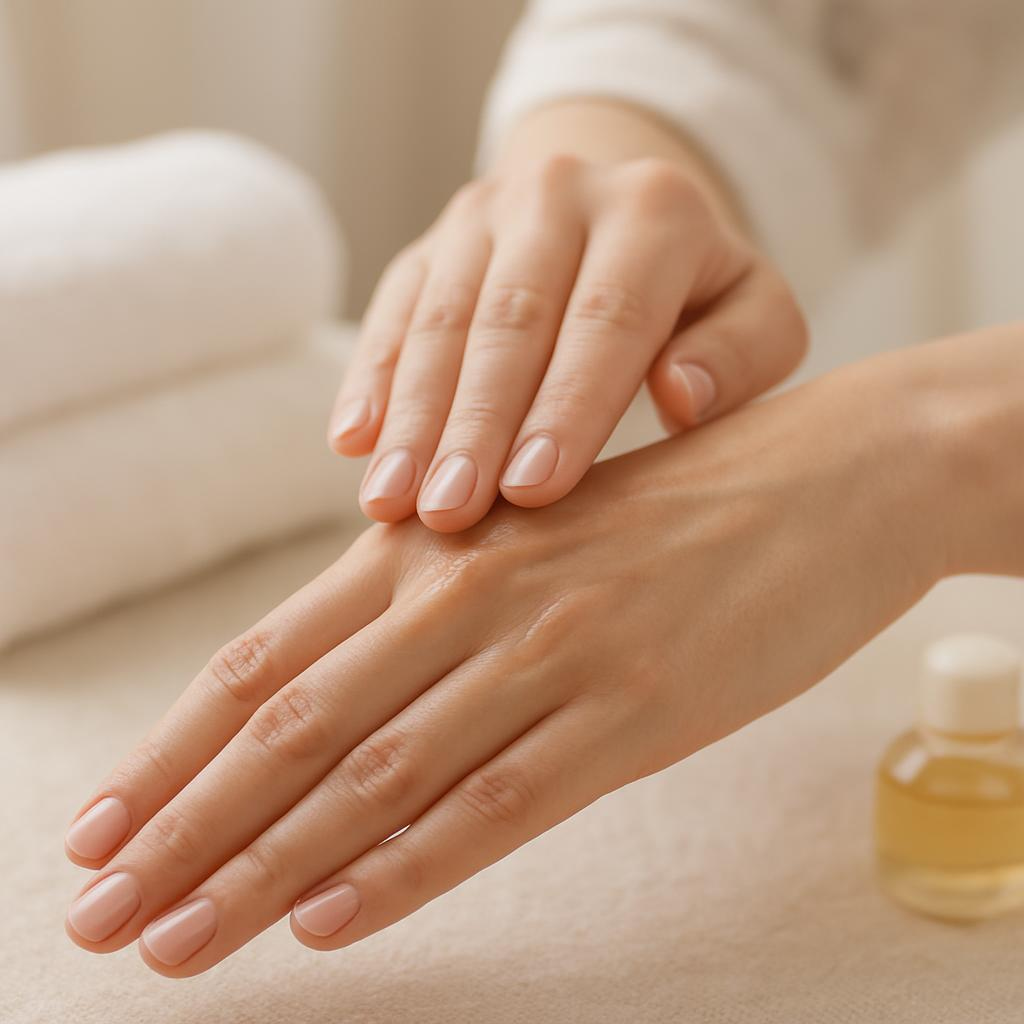
Research shows that castor oil contains fatty acid esters that help reduce transepidermal water loss (TEWL), protecting against environmental dryness.
According to a 2024 review in Frontiers in Dermatology, occlusive emollients like castor oil support skin barrier repair and are well-suited for people with dry, mature, or sensitive skin.
Note: Perform a patch test first; rare allergic reactions such as mild contact dermatitis have been reported.
7. May Support Joint and Muscle Comfort (Topical Use)

Castor oil packs are used in complementary wellness routines to support relaxation and circulation.
While scientific evidence is preliminary, a 2023 pilot study in the Journal of Integrative Medicine observed improved local warmth and comfort among participants using castor oil compresses.
Important: These applications are not medical treatments but may serve as gentle home wellness supports when combined with rest or light massage.
8. Supports Safe Labor Under Medical Supervision

Castor oil has been used in clinical settings to encourage uterine contractions during post-term pregnancies.
A 2023 meta-analysis in BMC Pregnancy and Childbirth reported a modest increase in spontaneous labor onset within 24 hours among participants who ingested small, supervised doses of castor oil. However, side effects like nausea and diarrhea were common.
Recommendation: Use only under qualified obstetric supervision—self-administration is not recommended.
Reference: BMC Pregnancy and Childbirth – Castor Oil and Labor Study.
9. May Have Mild Antimicrobial Properties

Laboratory studies indicate that castor oil and its derivatives may inhibit certain bacteria and fungi.
According to a 2024 review in Molecules, ricinoleic acid exhibits bacteriostatic effects on Staphylococcus aureus and Candida albicans, supporting its use in topical ointments and cosmetics.
However, these findings are preclinical, and castor oil should not replace standard antiseptics or antibiotics.
10. May Support Overall Skin and Lip Health

Castor oil is widely used in lipsticks, glosses, and balms due to its smooth texture, natural shine, and emollient properties.
A 2023 study in the Journal of Cosmetic Science confirmed that hydrogenated castor oil provides a non-greasy, film-forming effect that helps prevent chapping and improves lip hydration.
Its natural viscosity makes it ideal for protective skin coatings without clogging pores.
Tip: Look for cold-pressed or hexane-free varieties for cosmetic use.
How to Use Castor Oil Safely
Using castor oil the right way depends on your purpose—whether for digestion, skin, hair, or eyes. Always choose USP-labeled or pharmaceutical-grade products and follow dosage directions from the label or a healthcare professional.
1. Oral Use (Laxative)
- Purpose: Short-term relief of occasional constipation.
- Approved by: U.S. Food and Drug Administration (FDA) under the OTC monograph for stimulant laxatives.
- Dosage: Adults and children ≥12 years — 15 to 60 mL once daily; ages 2–12 — 5 to 15 mL; under 2 years — consult a doctor (DailyMed, 2025).
- Instructions: Take on an empty stomach with water. Do not exceed one dose per day or use longer than one week unless directed by a physician.
2. Topical Use (Skin and Hair)
- Skin: Apply a few drops to clean, damp skin to help seal in moisture.
- Hair & Scalp: Massage gently into the scalp or mix with lighter oils such as jojoba or argan for easier spread.
- Patch Test: Apply a small amount to your inner arm for 24 hours to check for sensitivity.
3. Ocular Use (Eye-Drop Formulations)
- Use only sterile, ophthalmic-grade drops containing castor oil (available in some dry-eye or meibomian-gland formulas).
- Do not use raw castor oil in or near the eyes.
- For persistent dryness, consult an eye-care specialist.
Possible Side Effects and Precautions
Castor oil is generally safe when used correctly, but misuse can cause adverse reactions. The table below summarizes key considerations.
| Concern | Description | Safe Guidance | Authoritative Source |
|---|---|---|---|
| Digestive distress | Cramping, diarrhea, or dehydration from overuse | Use short-term only and hydrate well | FDA OTC Laxative Monograph |
| Electrolyte imbalance | Prolonged laxative use may disrupt minerals | Avoid long-term internal use | NIH MedlinePlus |
| Pregnancy | May stimulate uterine contractions | Use only under obstetric supervision | BMC Pregnancy & Childbirth 2023 |
| Children < 2 years | Sensitive GI tract; risk of dehydration | Consult a pediatrician before use | Cleveland Clinic |
| Skin irritation | Rare allergic contact dermatitis | Patch-test before topical use | NIH PubChem |
| Medication interactions | May affect absorption of oral drugs | Separate by several hours | FDA Drug Safety Guidelines |
Storage and Product Quality Tips
Proper handling ensures that castor oil remains stable and effective.
- Temperature: Store at or below 25 °C (77 °F).
- Packaging: Keep tightly closed, away from direct sunlight and humidity.
- Shelf Life: Best used within 6–12 months after opening.
- Label Check: Look for “USP” on medicinal-grade products and “cold-pressed, hexane-free” on cosmetic or organic oils.
- Color & Smell: Should be pale yellow and neutral-smelling; discard if it turns cloudy or rancid.
- Safety: Keep out of reach of children and never store near food items to prevent accidental ingestion.
Where to Buy and Pricing (2025 U.S.)
Castor oil is widely available both online and in pharmacies. Below is a current price snapshot (as of November 2025).
| Type | Typical Size | Average Price Range | Where to Buy |
|---|---|---|---|
| USP Laxative Grade | 4 fl oz | $6 – $8 USD | CVS, Walgreens, Walmart Pharmacy |
| Cold-Pressed Cosmetic Grade | 16 oz | $8 – $20 USD | Amazon, Whole Foods, Ulta Beauty |
| Organic Certified (USDA) | 16 oz – 32 oz | $15 – $28 USD | Amazon, Thrive Market, iHerb |
| Ophthalmic Formulations | 10 mL | $10 – $15 USD | Drugstores and Eye Clinics |
Tip: Always verify that the label states “For external or laxative use as directed” and includes batch number and expiry date.
Frequently Asked Questions (FAQs)
1. Is it safe to drink castor oil?
Yes—for short-term constipation relief under labeled doses. Do not use continuously or in large quantities.
2. Can I use castor oil every day on my skin?
Yes, topical use is generally safe for daily moisturizing if no irritation occurs.
3. Does castor oil promote hair growth?
There’s no conclusive clinical proof, but it may support scalp hydration and improve hair appearance.
4. Can pregnant women take castor oil to start labor?
Only under medical supervision. Unsupervised use can cause dehydration and cramping.
5. Is there ricin in castor oil?
No. Properly processed castor oil is ricin-free, according to the FDA and NIH.
6. Can I use castor oil on my eyes?
Only use sterile, ophthalmic-grade formulations; never apply raw oil directly.
7. How do I know if my castor oil is authentic?
Look for USP or organic certification, brand reputation, and tamper-evident packaging.
Conclusion
Castor oil is a versatile natural oil that supports digestive regularity, skin hydration, and overall wellness when used appropriately.
Its scientifically verified uses—particularly as an FDA-approved laxative and effective skin emollient—make it valuable in both personal care and health routines.
Use responsibly:
- Follow labeled dosage for internal use.
- Choose high-quality, cold-pressed or USP-certified products.
- Patch-test before applying to sensitive skin.
- Consult a healthcare professional if you’re pregnant, on medication, or have chronic conditions.
Used mindfully, castor oil can be a safe, evidence-based addition to your wellness and skincare routine.
This content is for informational purposes only and not medical advice.
References:
- DailyMed – Castor Oil Laxative Labeling (2025)
- Cleveland Clinic – Castor Oil Benefits and Risks
- BMC Pregnancy and Childbirth (2023) – Castor Oil and Labor Induction Study
- Clinical Ophthalmology (2023) – Castor-Oil-Based Eye Drops and Meibomian Gland Dysfunction
- MD Anderson Cancer Center – What to Know About Castor Oil Health Claims
